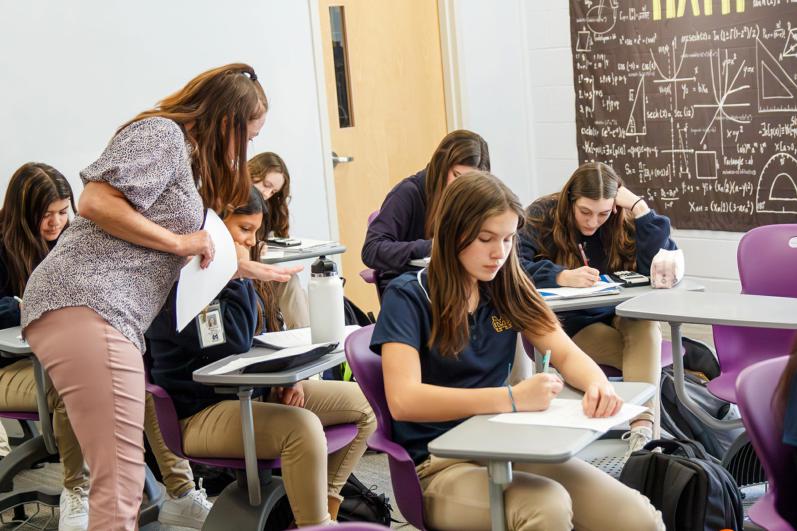Forming the Future: 'Best of both worlds': The co-divisional model at Malden Catholic
MALDEN -- When Luna Murray, a senior at Malden Catholic High School, has a bad hair day, she knows that her classmates will understand and help her. Since her classes are all-female, she knows that her classmates will have hair ties to spare, too.
"It's a supporting environment," she said. "Everyone kind of knows what everyone's going through. You don't have to explain it to your friends beside you. They have that intuition."
All of Luna's classmates are girls, but Malden Catholic is not an all-girls school. Malden Catholic is one of only two high schools in the country with a co-divisional model. Both boys and girls go to a co-divisional school, but are taught in different classes during the day.
"Boys and girls have different issues at that age," said Malden Catholic President John Thornburg. "As they work and grow in their faith, they're able to relate to peers of the same gender, and I think that creates very strong bonds for that type of faith formation."
Malden Catholic was an all-boys school from its founding in 1932 until the co-divisional model was established in 2018. There was an all-girls Catholic school adjacent to Malden Catholic called Girls Catholic, but it closed in 1992. The Malden Catholic school board wanted to restore Catholic education for local girls without disrupting the "brotherhood" that the boys had historically enjoyed. When they discovered Regis, a Colorado Jesuit high school with a co-divisional model, they found their solution.
Malden Catholic Principal Jeffrey Smith said that admitting girls "raised the level of spirit, energy, and enthusiasm in the building."
"Immediately from the social aspect," he said, "it gave students an opportunity they hadn't had in previous years."
Currently, the school is home to 861 students -- 418 in the boys division and 443 in the girls division. Each division has its own valedictorian, student council, academic awards, lunch period, and library. The boys library contains books about English and history, while the girls library contains books about science. If a student wants a book from the opposite gender's library, he or she must ask the librarian to get it.
"I feel like being in a class full of boys, there's not too many distractions that take away from your learning experience," said senior Vincent Nguyen.
For example, he said, there's no risk of embarrassing yourself in front of your crush if you raise your hand and give a wrong answer.
"I'm with all my friends," he said. "It's a lot easier to make friends, being in an all-boys class."
"One of the major benefits the students seem to think about is their ability to focus," said Dianne James, a marketing consultant for the school. "They feel like they're more relaxed in a way, and focused on academics."
Smith added that students also "feel more comfortable expressing their opinions" when they're in single-gender classrooms. Along with being the principal, Smith teaches history to boys and girls. He notices that when he teaches World War II, the boys are more interested in "who and what" while the girls are more interested in "why" the war happened.
"Knowing the audience in front of me gives me the opportunity to tailor my instruction," he said.
He said that "it's still too early to tell" how co-divisional learning has impacted test scores, but in the last five years, 25 percent of Malden Catholic students have been accepted into "highly competitive" universities like Harvard and Boston College.
Thornburg said that in single-gender classrooms, students have the opportunity to work on themselves. In after-school clubs, which are integrated, boys and girls can work on teamwork and building relationships.
"What they learned in the classroom as far as developing their confidence," Smith added, "they bring that work outside of the classroom."
He has noticed boys and girls working well together in clubs like robotics, Mock Trial, and Model U.N..
"You kind of get the best of both worlds," said senior Jenna Lapenta. "When I'm in classes with all girls, it's much easier to focus. After school, I'm able to socialize with everybody."
Jenna is the founder and president of the school's Operation Smile Club, where boys and girls raise money for life-saving surgery for children with cleft palates.
"It's not that different," she said, "going from an all-girls class to interact with boys. It's a great way to interact with both genders."



















